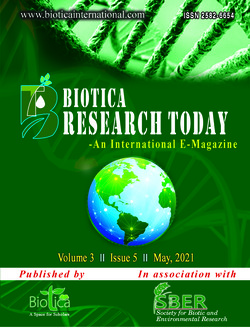
Impacts of Lightening on Agriculture and Its Remediation
Aswathy S. Nair*
State Emergency Operation Centre, Kerala State Disaster Management Authority, Kerala (695 033), India
Durga C.
Dept. of Agronomy, Kerala Agriculture University, Vellanikkara, Thrissur, Kerala (680 656), India
DOI: NIL
Keywords: Agriculture, Disaster, Lightening injury, Nitrogen fixation
Abstract
Lightening is one of the naturally occurring devastating disaster causing dreadful effects in all sectors. Considering the frequency of occurrence and impact, Kerala declared lightening as a state disaster. Lightening causes death fatalities as well losses in agriculture sector. Lightening causes pull up of palm trees and premature fruit drop or deflation in other crops. The main challenge posed by lighting injury is to diagnosis the problem correctly. At the same time lightening benefits soil by adding atmospheric nitrogen. Earth Networks contributes to national, state and municipal efforts to minimize lightning injuries and damage by deploying and operating total lightning detection networks. Other than this, farmers need to take precautionary actions based on bulletins published by concerned authority.
Downloads
not found
Reference
Murli Das S., Sampath, S., Mohankumar, G., 2007. “Lightning hazard in Kerla”. J. Marine Atmos. Res. 3, 111–117.
Shearman, K, M., Ojala, C, F., 1999. “Some causes for lightning data inaccuracies: the case of Michigan”. Bull. Am. Meteorol. Soc. 80, 1883–1891.
Tinmaker, MR., Chate, D, M., 2013. “Lightning activity over India: a study of east–west contrast”. Int. J. Remote Sens. 34, 5641–5650.
